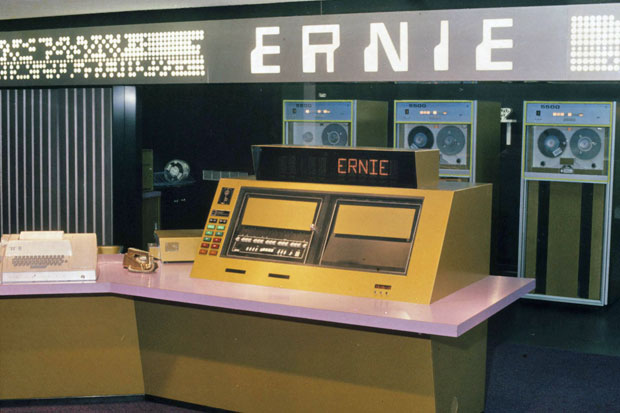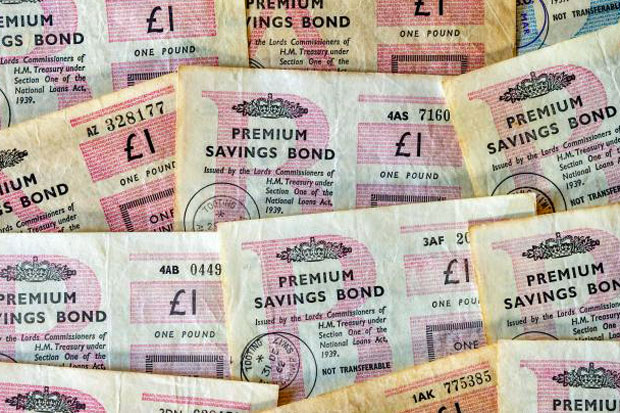What Are Premium Bonds?
Premium bonds are a type of investment issued by the UK government-backed savings institution, National Savings and Investments (NS&I). They are a popular investment choice in the UK, with about a third of the population people holding them. Premium bonds are classed as good savings accounts yet they are a unique form of investment, where instead of receiving interest on their investment, bondholders are entered into a monthly prize draw, where they have the chance to win tax free cash prizes and there is a pretty good chance of winning too. It is easy to buy premium bonds at any time especially now there is an option to buy premium bonds online. So if you want more bonds, you can purchase premium bonds to be held within your savings account, rather than in a bank account.
Premium Bonds History – ERNIE
The power behind Premium Bonds is something known as ERNIE, an acronym for Electronic Random Number Indicator Equipment.
A Bletchley Park code breaker invented the first ERNIE in 1956. Following this, British Prime Minister Harold Macmillan announced the launch of Premium Bonds in April 1956, giving everyone an alternative way to save. Since then, there have been five different generations of ERNIE and with advances in technology, each generation has become faster and more powerful.

ERNIE generates random numbers via something known as quantum random number generator and these numbers drawn are matched against all eligible Bond numbers to determine the lucky winners of tax free prizes in the monthly prize draw. Because it is purely random, every bond number, whether it has 8, 9, 10 or 11 digits, has a separate and equal chance of winning a prize in the monthly draw, and the published odds of winning for each £1 Bond is a respectable 24,000 to 1 so there is a real chance to win big and get a big prize every month.
Premium Bonds & HM Treasury
The HM Treasury is responsible for the management of Premium Bonds in the United Kingdom. The Treasury ensures that prizes awarded on Premium Bonds are fair and transparent, and that all prize money owed is paid out correctly to UK savers. In addition, the Treasury also works with EuroMillions to ensure the highest levels of security for Premium Bond holders when buying bonds. The relationship between HM Treasury and Premium Bonds is strong, as the government department provides oversight and assurance to help keep people’s investments safe, and to ensure both top prizes and smaller prizes are available.
Where Do Premium Bonds Go When Someone Dies
When a premium bond holder dies, their premium bonds become part of their estate. The estate is the total sum of everything that the deceased person owned, so all their assets which includes their property, money, and possessions. The distribution of an estate after someone’s death is known as the process of probate, which is the legal process of verifying the deceased person’s Will and distributing their assets to their beneficiaries.
The first step in the process of dealing with premium bonds after someone dies is to notify NS&I of the bondholder’s death. This can be done either by the executor of the Will, if there is one, or by a family member or friend of the deceased. NS&I will need to be provided with the deceased person’s name, address, date of birth, and National Insurance number, as well as ideally the bondholder’s Premium Bond holder’s number.
After receiving notification of the bondholder’s death, NS&I will freeze the bondholder’s account and all the bonds in the account will no longer be eligible for any prize draws. NS&I will then send a claim form to the executor of the Will or the next of kin of the deceased, who will need to complete and return the form along with the relevant documentation. The documentation required will depend on the value of the estate and the relationship between the deceased and the person returning the claim form.
If the total value of the estate is less than £5,000, the executor or next of kin may not need to obtain a grant of probate. If the total value of the estate is more than £5,000, then the executor of the Will must obtain what is called a grant of probate before they can access the deceased person’s assets, including their premium bonds. A grant of probate is a legal document that gives the executor the authority to deal with the deceased person’s estate.
Premium Bonds

Once the grant of probate has been obtained, the executor or next of kin can provide NS&I with a copy of the grant of probate, as well as the completed claim form and any other necessary documentation. NS&I will then transfer the premium bonds to the executor or next of kin, or whoever is named as the giftee of the premium bonds in the Will, who can decide whether to cash them in or keep them invested. It is important to note that the executor or next of kin will be responsible for any tax liabilities arising from the premium bonds.
Premium Bonds Transfer
In general, it can take up to a month for NS&I to process a claim and transfer the money into an appropriate bank account. The process may be quicker if all the necessary paperwork and documentation are included when the form is sent to them.
It is important that any changes of ownership are completed correctly in order for them to be valid. The most common mistake that people make is forgetting to sign or date their forms correctly; if this happens, it may delay processing times or even cause the transfer to fail entirely. In addition, anyone wishing to transfer premium bonds is advised not to send cash through the post but instead use other methods such as bank transfers or cheques.
Cashing In Premium Bonds
If the premium bonds are cashed in, the proceeds will be added to the deceased person’s estate and distributed according to their Will, and if there is no Will, according to the laws of intestacy instead. If the premium bonds are kept invested, the executor or next of kin will become the new bondholder, and they will be eligible to win tax free prizes in the prize draws in the same way as the original bondholder was.
It is worth noting that if the deceased person was a monthly prize winner, any prize money that they were due to receive before their death will be paid to their estate. However, if the prize is won after the bondholder’s death, the prize money will be paid with a cheque payable to the new bondholder.
Jointly Held Premium Bonds
If the premium bonds are held jointly by two people, which is often the case as joint savings accounts were promoted as sound advice in the past, especially for saving income tax purposes, then the surviving bondholder will become the sole owner of the bonds. They will need to notify NS&I of the other bondholder’s death and provide a death certificate as evidence.
Gifting Premium Bonds Via A Will
Finally, it is wise to declare your premium bonds within your Will and you can choose to gift them to an individual if you wish. This is just one of many features available to you if you write your Will online with our proven online will writing service.
In summary, when somebody dies, their premium bonds become part of their estate, and the process of dealing with the premium bonds will depend on the total value of the estate and whether a grant of probate is required.